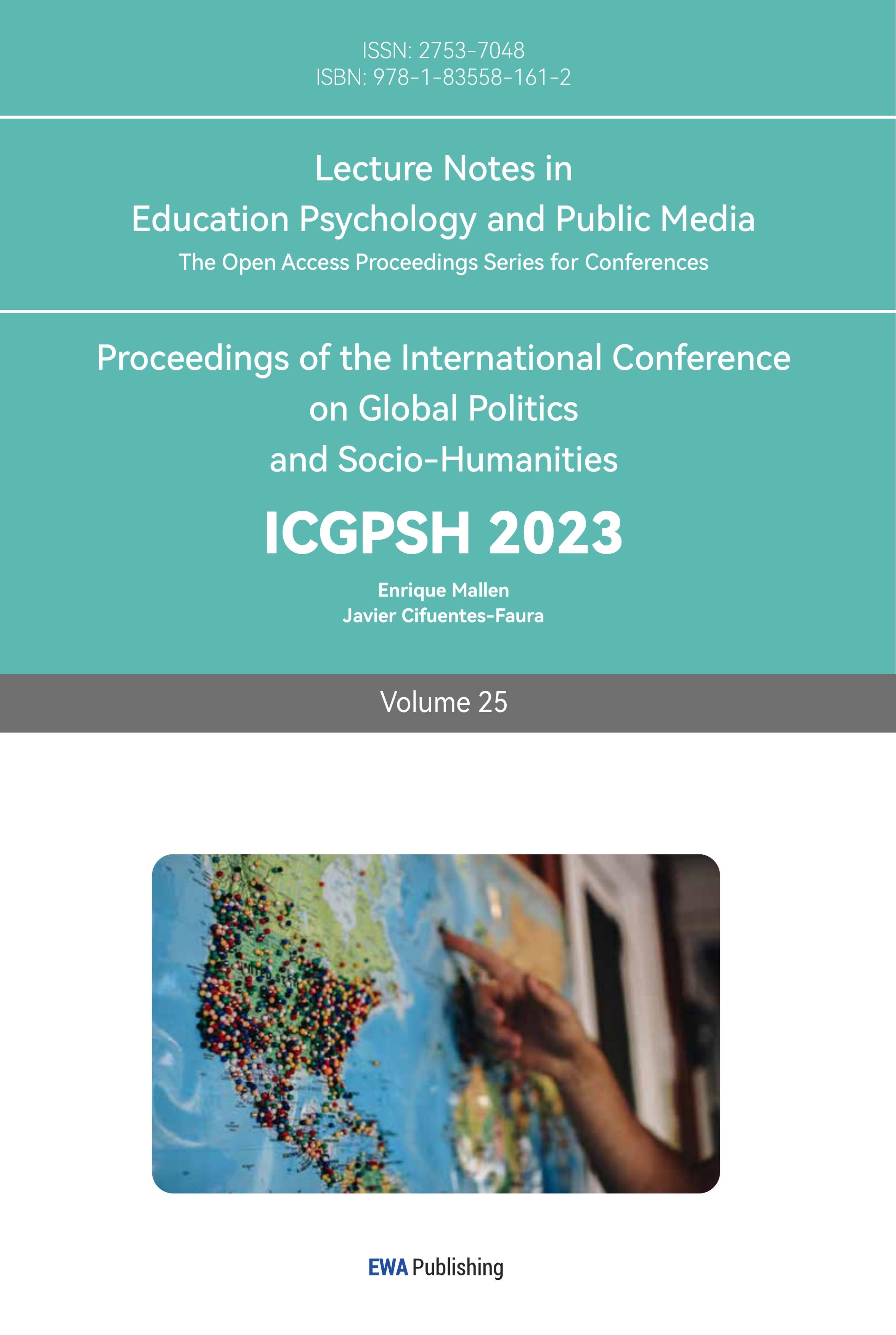References
[1]. Mehmet Firat .(2023).How Chat GPT Can Transform Autodidactic Experiences and Open Education? Anadolu University.doi: 10.31219/osf.io/9ge8m
[2]. Wu Yonghe, Liu Bowen & Ma Xiaoling.(2017).Constructing an Ecosystem of “Artificial Intelligence + Education” . Chinese Journal of Distance Education(05),27-39. doi:10.15881/j.cnki.cn33-1304/g4.2017.05.003.
[3]. Lin Shule.Development and Design of Personalized Self-Study System Based on Artificial Intelligence Technology . China Educational Technology & Equipment.
[4]. YU Hao, ZHANG Wenlan.(2023).Challenges and opportunities for education under ChatGPT technology. China Medical Education Technology (03),260-267. doi:10.13566/j.cnki.cmet.cn61-1317/g4.202303003.
[5]. YE Ziyi, SUN Lihong.(2023).An analysis of the status quo and improvement strategies of artificial intelligence boosting college students’ autonomous English learning. Overseas English(08),124-127+134.
[6]. ZHANG Zhenyu, HONG Huaqing.(2023).Foreign language teaching supported by ChatGPT: Empowerment, Issues, and Strategies. Foreign Language World(02),38-44.
[7]. ZHUANG Yanming.(2021).Research on cultivating college students’ autonomous learning ability under mixed teaching mode. Journal of Chifeng University (Natural Science Edition)(11),102-105. doi:10.13398/j.cnki.issn1673-260x.2021.11.026.
[8]. HUANG Ronghuai.(2023).Artificial Intelligence is accelerating change in education: Real Challenges and Solutions. Journal of the Chinese Society of Education(06),26-33.
[9]. Haiyan YANG, Tao LI.(2023).Teaching Application, Limitations and Breakthrough Strategies of ChatGPT. Chinese Journal of ICT in Education(06),26-34.
[10]. Jianli Jiao.(2023).ChatGPT Boosting Digital Transformation of Education in Schooling: What to Learn and How to Teach in the Era of Artificial Intelligence. Chinese Journal of Distance Education(04),16-23. doi:10.13541/j.cnki.chinade.20230226.001.
[11]. XU Guangmu, XIONG Xuhui, ZHANG Yi, WEI Qingqing.(2023).The Difficulties, Opportunities, Application Scenarios, and Challenges of Digital Transformation of Educational Examination under ChatGPT. Journal of China Examinations(05),19-28. doi:10.19360/j.cnki.11-3303/g4.2023.05.003.
[12]. WANG Zhengqing,AYIBUEN·Bieerlike .Beyond ChatGPT: Possible Value and Traps of GPT-4 Application in Future University Teaching. Modern Distance Education. doi:10.13927/j.cnki.yuan.20230712.002.
[13]. ZHU Yuanyun, HUANG Haitao.(2022).The Turn, Predicament and Breakthrough of Ideological and Political Education for College Students in the Era of Artificial Intelligence.J. of Jiangsu Normal Uni. (Philosophy and Social Sciences Edition)(06),107-114+124. doi:10.16095/j.cnki.cn32-1833/c.2022.06.002.
[14]. ZHOU Hong-yu, LI Yu-yang.(2023).The Impact of ChatGPT on Education Ecology and Strategies to Cope with it . Journal of Xinjiang Normal University (Philosophy and Social Sciences) (04),102-112. doi:10.14100/j.cnki.65-1039/g4.20230224.001.
[15]. JIANG Hua1, WANG Chunxiu2, 3, YANG Shudong.(2023).Application Potential, Risks and Challenges of Generative AI in the Field of Education and Countermeasures. Modern Education Management(07),66-74. doi:10.16697/j.1674-5485.2023.07.007.
Cite this article
Ma,T. (2023). The Influence of ChatGPT on Autonomous Learning for College Students. Lecture Notes in Education Psychology and Public Media,25,172-179.
Data availability
The datasets used and/or analyzed during the current study will be available from the authors upon reasonable request.
Disclaimer/Publisher's Note
The statements, opinions and data contained in all publications are solely those of the individual author(s) and contributor(s) and not of EWA Publishing and/or the editor(s). EWA Publishing and/or the editor(s) disclaim responsibility for any injury to people or property resulting from any ideas, methods, instructions or products referred to in the content.
About volume
Volume title: Proceedings of the International Conference on Global Politics and Socio-Humanities
© 2024 by the author(s). Licensee EWA Publishing, Oxford, UK. This article is an open access article distributed under the terms and
conditions of the Creative Commons Attribution (CC BY) license. Authors who
publish this series agree to the following terms:
1. Authors retain copyright and grant the series right of first publication with the work simultaneously licensed under a Creative Commons
Attribution License that allows others to share the work with an acknowledgment of the work's authorship and initial publication in this
series.
2. Authors are able to enter into separate, additional contractual arrangements for the non-exclusive distribution of the series's published
version of the work (e.g., post it to an institutional repository or publish it in a book), with an acknowledgment of its initial
publication in this series.
3. Authors are permitted and encouraged to post their work online (e.g., in institutional repositories or on their website) prior to and
during the submission process, as it can lead to productive exchanges, as well as earlier and greater citation of published work (See
Open access policy for details).
References
[1]. Mehmet Firat .(2023).How Chat GPT Can Transform Autodidactic Experiences and Open Education? Anadolu University.doi: 10.31219/osf.io/9ge8m
[2]. Wu Yonghe, Liu Bowen & Ma Xiaoling.(2017).Constructing an Ecosystem of “Artificial Intelligence + Education” . Chinese Journal of Distance Education(05),27-39. doi:10.15881/j.cnki.cn33-1304/g4.2017.05.003.
[3]. Lin Shule.Development and Design of Personalized Self-Study System Based on Artificial Intelligence Technology . China Educational Technology & Equipment.
[4]. YU Hao, ZHANG Wenlan.(2023).Challenges and opportunities for education under ChatGPT technology. China Medical Education Technology (03),260-267. doi:10.13566/j.cnki.cmet.cn61-1317/g4.202303003.
[5]. YE Ziyi, SUN Lihong.(2023).An analysis of the status quo and improvement strategies of artificial intelligence boosting college students’ autonomous English learning. Overseas English(08),124-127+134.
[6]. ZHANG Zhenyu, HONG Huaqing.(2023).Foreign language teaching supported by ChatGPT: Empowerment, Issues, and Strategies. Foreign Language World(02),38-44.
[7]. ZHUANG Yanming.(2021).Research on cultivating college students’ autonomous learning ability under mixed teaching mode. Journal of Chifeng University (Natural Science Edition)(11),102-105. doi:10.13398/j.cnki.issn1673-260x.2021.11.026.
[8]. HUANG Ronghuai.(2023).Artificial Intelligence is accelerating change in education: Real Challenges and Solutions. Journal of the Chinese Society of Education(06),26-33.
[9]. Haiyan YANG, Tao LI.(2023).Teaching Application, Limitations and Breakthrough Strategies of ChatGPT. Chinese Journal of ICT in Education(06),26-34.
[10]. Jianli Jiao.(2023).ChatGPT Boosting Digital Transformation of Education in Schooling: What to Learn and How to Teach in the Era of Artificial Intelligence. Chinese Journal of Distance Education(04),16-23. doi:10.13541/j.cnki.chinade.20230226.001.
[11]. XU Guangmu, XIONG Xuhui, ZHANG Yi, WEI Qingqing.(2023).The Difficulties, Opportunities, Application Scenarios, and Challenges of Digital Transformation of Educational Examination under ChatGPT. Journal of China Examinations(05),19-28. doi:10.19360/j.cnki.11-3303/g4.2023.05.003.
[12]. WANG Zhengqing,AYIBUEN·Bieerlike .Beyond ChatGPT: Possible Value and Traps of GPT-4 Application in Future University Teaching. Modern Distance Education. doi:10.13927/j.cnki.yuan.20230712.002.
[13]. ZHU Yuanyun, HUANG Haitao.(2022).The Turn, Predicament and Breakthrough of Ideological and Political Education for College Students in the Era of Artificial Intelligence.J. of Jiangsu Normal Uni. (Philosophy and Social Sciences Edition)(06),107-114+124. doi:10.16095/j.cnki.cn32-1833/c.2022.06.002.
[14]. ZHOU Hong-yu, LI Yu-yang.(2023).The Impact of ChatGPT on Education Ecology and Strategies to Cope with it . Journal of Xinjiang Normal University (Philosophy and Social Sciences) (04),102-112. doi:10.14100/j.cnki.65-1039/g4.20230224.001.
[15]. JIANG Hua1, WANG Chunxiu2, 3, YANG Shudong.(2023).Application Potential, Risks and Challenges of Generative AI in the Field of Education and Countermeasures. Modern Education Management(07),66-74. doi:10.16697/j.1674-5485.2023.07.007.









